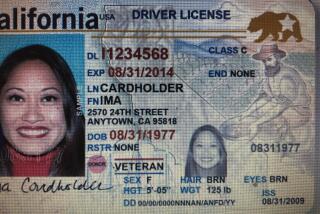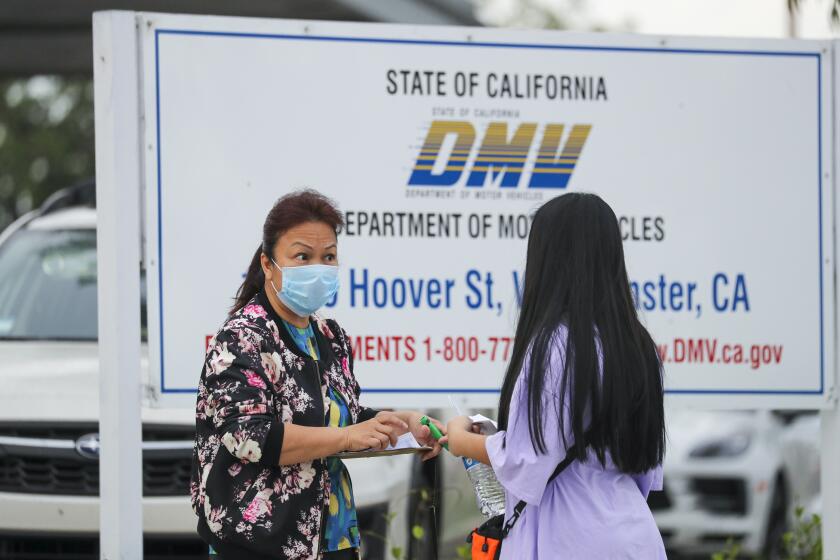Williams Takes an Early Risk by Supporting Charter Change : Reform: His willingness to speak out is seen by some as a boost to the campaign. But it puts the new chief at odds with Gates and officers’ union.
Editor’s note: Because of a production error, portions of this story published Friday were omitted from some editions of The Times. It is reprinted here in its entirety. Even from the sidelines, where he insists he will stay, Los Angeles Police Chief-designate Willie L. Williams has already become a controversial player in the campaign to give City Hall greater authority over the Police Department.
Williams’ statement of support for Proposition F, the proposed charter amendment affecting the Police Department, gives its proponents a new dose of credibility as they attempt to counter the opposition of outgoing Police Chief Daryl F. Gates.
At the same time, Williams’ readiness Thursday to speak out on the issue of a charter amendment plunges him into a potentially divisive struggle as he sets out to gain the confidence of the public and the Police Department. Williams’ endorsement of the charter amendment pits him against Gates and the outgoing chief’s intensely loyal following. It also puts Williams at odds with the 8,100-member Police Protective League, which is opposed to the charter amendment.
Veteran political consultant Joseph Cerrell, who is not involved in the charter campaign, said that Williams’ remarks could help the campaign for the charter amendment but harm him as he moves into his new post.
“I think it’s a plus for the campaign because the average voter who doesn’t know beans about charter reform will be impressed to hear that the new chief is urging a ‘yes’ vote,” Cerrell said.
“Even if Williams is not an active campaigner, the sentiments of the man who is going to be the next police chief will matter to people.”
On the other hand, Cerrell said, “it may have done him a real disservice. You bring the new guy into town and right away stick him into local politics. It’s not a great way to make friends, and he needs to make more friends than enemies.”
William Violante, president of the Police Protective League, was quick to criticize Williams, arguing that the next chief was making it clear that his loyalty was to the politicians who had appointed him and not to the department he will be heading.
“We find it incredible,” Violante said, “that Williams took that occasion to announce his support of Mayor Bradley’s and the City Council’s attempt to pass Charter Amendment F. We fear that by his action that he has sent a message to (the) city of Los Angeles that his allegiance is to the politicians and not to the department that he has been chosen to head.”
In interviews at City Hall and the Los Angeles Times, Williams affirmed his support for the charter amendment by citing his experience in a city where the police chief serves at the pleasure of the mayor.
Williams said the system in Philadelphia gives the mayor even greater power over the police chief than is proposed by the Los Angeles City Charter amendment, which would spread the authority among the mayor, City Council and Police Commission.
Williams said that in his experience, power in the hands of politicians did not lead to interference in the Police Department.
“I have worked for two mayors and three managing directors, and I have never been asked, encouraged or directed to make an assignment or a transfer or to promote somebody over someone,” Williams said.
Williams said he did not plan to take part in campaign events on behalf of the charter amendment. “I’m not going to get in a debate with Gates,” he said. But Williams indicated that he will speak his mind on the issues facing the voters.
“It is appropriate for people to hear my views because I am the next chief of police in Los Angeles.”
Up to now, the coalition of liberal political leaders, business executives, civil rights activists and clergy that launched the campaign for the charter amendment has had little active law enforcement representation on its side. The campaign had recruited two retired Los Angeles police chiefs--businessman Tom Reddin and Republican state Sen. Ed Davis--to counter opposition efforts by Gates and the Police Protective League. They maintain that giving City Hall more power will politicize the department and invite corruption.
But Reddin, out of office for more than two decades, and Davis, gone since 1978, are vulnerable to criticism that they are out of touch and no longer know what is best for law enforcement.
T This week, consultants for the charter amendment campaign said a statement of support by the new chief could give them a big boost, but they insisted that they had no idea where Williams stood on the issue.
“It would be the answer to a prayer if the new chief comes along and said the charter amendment would give him the tools he needed to work with,” said one consultant who asked to remain anonymous. “If he were to say something like that, it would blunt the effectiveness of Daryl Gates.”
Warren Christopher, the lawyer whose commission recommended the charter changes, said Williams’ views were a welcome surprise.
“It will be very helpful to have someone with his law enforcement experience affirm the values of the charter amendment and indicate that he thinks they are entirely compatible with the independence of the chief of police,” Christopher said.
More to Read
Start your day right
Sign up for Essential California for news, features and recommendations from the L.A. Times and beyond in your inbox six days a week.
You may occasionally receive promotional content from the Los Angeles Times.






